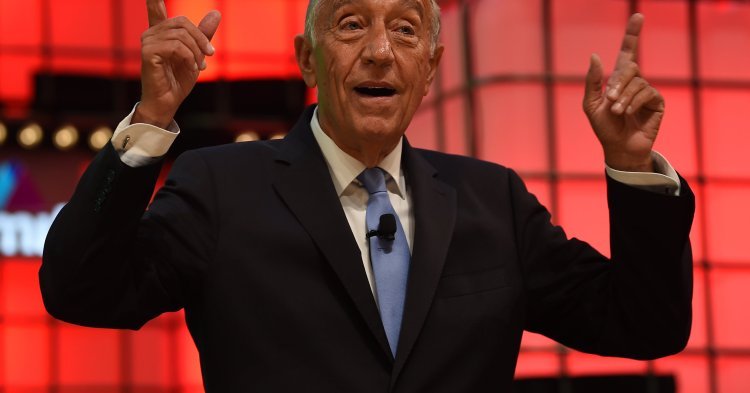Rebelo de Sousa, the obvious winner
In the midst of a second lockdown, with closed schools and thousands of people unable to vote due to infection, Marcelo Rebelo de Sousa, the Portuguese Republic’s president since 2015, was unsurprisingly reelected with over 60% of the vote, and almost 48% ahead of the second-placed candidate, Ana Gomes. His victory was more than expected: every democratic president since 1974 has been re-elected, and he remains one of the most popular politicians in the country, with very positive approval ratings.
Rebelo de Sousa was once a contested and unsuccessful leader of the country’s second biggest party, the centre-right PSD, but after more than ten years doing political commentary on the prime-time of Portugal’s most-watched TV channel, he learned how to use his charismatic personality in his favour. The somewhat ceremonial role of the president in a semi-presidential republic, and his apparently good relationship with Prime Minister António Costa and his socialist government, have allowed him to avoid most major political controversies, and to shape an image of proximity with the people.
Switching on the TV, one has a good chance of finding Marcelo hugging people at a public event, or giving an interview in the middle of a swim or while bare-chested on the beach. So much so, that he has adopted the unofficial title of ’President of hugs and affections’, and taking selfies with the president seems to be the new national sport, for which a word has coined: a “Marcelfie”.
The only fear president Marcelo could have had about the election was the possibility of a great increase in the abstention rate. Portugal is the country with the most Covid cases and deaths per million inhabitants in the world, and there was a real concern that it would be a considerable deterrent. Despite this, the voting process went smoothly, and although there was a rise in abstention numbers compared to five years ago (where it had already reached over 50%), the difference was only slight.
But the success of a candidate of the “social right-wing”, as he identifies himself, must have other explanations in a country which predominantly elects left-wing or centre-left parties. The Socialist Party (PS), after all, governs since 2015 (with support from smaller left-wing parties), and consistently polls at around 40%. Ultimately, however, the PS decided not to stand nor endorse any candidate. Even PM Costa implicitly supported Marcelo, unofficially launching his candidacy by suggesting that the president would be the same for the next five years. Some say that this approach was based on the PS wanting to preserve its numbers and not have the party face the risk of an election loss. Whatever was the reason, it was a decision which indeed shaped the election.
The other election: the left and the far-right
There is much to this election apart from Marcelo Rebelo de Sousa’s big first-round win. There was a fight for the essence of the left, and against the menace of the xenophobic far-right.
There was some internal outcry within the PS - coming particularly from its left-wing sector - about the decision not to endorse a candidate. Ana Gomes, a diplomat and former MEP stemming from the party’s left, is a well-known political figure in the country. Famous for her role in the independence of Timor-Leste, and more recently in the fight against tax evasion and corruption by publicly defending Rui Pinto, a Portuguese hacker and whistleblower who is being prosecuted, Gomes decided to run for president. She did so with the support of two smaller parties, the animalist party PAN and the left-wing pro-European party LIVRE, but without her party’s full support, as many members (including several ministers) decided instead to back Marcelo, other left-wing candidates, or not to show their preference publicly.
The widespread myth that Portugal, somewhat like Ireland, was immune to the far-right, came to an end in 2019 after the far-right party Chega! (Enough!) elected its first deputy, polling at 1,29%. André Ventura, their vocal leader and sole deputy, decided to run for president, following growing poll numbers and a good result in the Azores regional election, which ended with Chega!’s parliamentary support of a right-wing regional government. This would be the first big test for the far-right after entering parliament, and consequently after achieving a much more prominent media presence.
Bloco de Esquerda (Left Bloc) and the Communist Party (PCP), decided to propose their own candidates, Marisa Matias (who also ran in 2016) and João Ferreira, both MEPs. It was a strategy which would allow them to introduce topics like the defence of the national health care system, of social support programmes, and of the Constitution; and the adoption of more robust measures against climate change, topics which made the far-right uncomfortable, shifting the campaign from their preferred focus on corruption and the allegedly subsidy-dependence by ethnic minorities.
With positive poll numbers and an effective media presence, Ventura quickly attempted to polarize the election as between him and Ana Gomes, vowing to resign as his party’s president if his result was lower than hers. On the other hand, Gomes repeatedly claimed that Chega! should not have been legalized, and that she would never swear in a government with far-right ministers.
This was by far the most televised election, with electoral debates in which every candidate faced each other. Ventura is a TV animal, a career which brought him to fame through football and crime commentary on a cable channel. In the debates, he behaved like he did in his previous career, by speaking louder than any other candidate and launching constant accusations. He argued that he would not be the president of all Portuguese citizens, feeling good about a “dictatorship of the well-intentioned Portuguese”. Even on debates where he was not present, there were often questions from the journalists about him. The Roma community was also a talking point of the campaign, with Chega! following clearly previous far-right experiences in other countries, by mobilizing hate against minorities.
The election, therefore, quickly became a race for the second place. According to the polls, Ana Gomes and André Ventura would be the most well-positioned for that goal. There were multiple cries for left unity against the far-right, with some evoking the bad example of the French elections of 2002, but Matias and Ferreira decided to stay in the race.
One big moment in the race was when Ventura mocked women, and Marisa Matias in particular, for using lipstick, generating the movement #VermelhoEmBelém (#RedInBelém), where hundreds of people shared a picture of them with red lipstick on.
The results - and what’s next
When the results started to come out, it was not clear who would be in second place. Ultimately, Ana Gomes won (polling at 13%), while Ventura following at 12%. While some are relieved that Ventura didn’t obtain the second place he wanted, one can hardly call this a decisive defeat. It was very close, and his rate of growth is unprecedented. The left-wing candidates also obtained disappointing results, with João Ferreira had 4,3% and Marisa Matias 4% (five years ago, Marisa had 10,12%).
Many factors may have produced these results. They represent a failure of the left’s strategy to contain the far-right, but it is hard to predict what would have happened if any of the left-wing candidates had not run or shifted their support to another candidate. On the other hand, a candidate with the full support of PS would have definitely done much better. The right and centre-right wing parties’ complacency through their regional government in the Azores, and the centre-right’s refusal to preemptively reject any national government with them, is contributing to Chega!’s normalisation, a factor which might also help explain the results.
We now know that the far-right is here to stay, and that Portugal’s immunity spell is broken. It is now time to figure out how to tackle them.


Follow the comments: |
|
